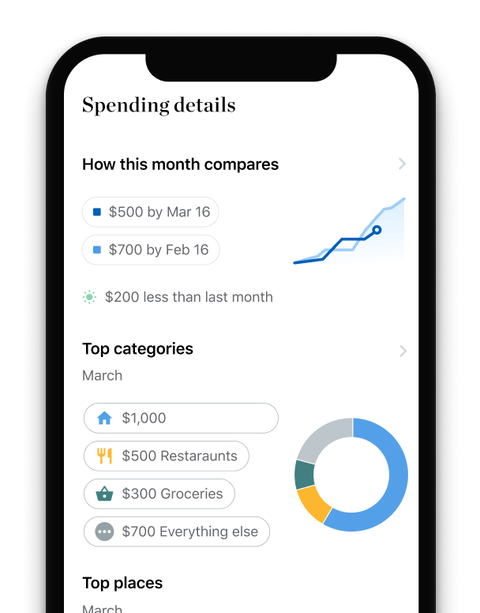Landing a high-paying job without spending four years and tens of thousands of dollars on college tuition may be getting more plausible.
In recent years, many of America’s largest companies have announced they will no longer require a college degree for high-paying office jobs. That list includes Google, IBM, Tesla, Accenture, Walmart, Dell, Verizon, Delta, General Motors, Bank of America and Home Depot among others.
Track all the money you make
See the ins and outs of your cash, cards, and bank accounts at a glance.

In a recent poll conducted by Intelligent.com, 33% of 750 companies surveyed said they eliminated bachelor’s degree requirements for at least some open roles so far in 2024; another 25% said they plan to do so by 2025. Intelligent.com is a “a platform dedicated to helping students and young professionals navigate the future of work.”
“Eliminating bachelor’s degrees from the hiring and recruiting process is becoming increasingly popular across many industries,” Huy Nguyen, a career development advisor from Intelligent.com, said in a written statement. “By removing degree requirements, companies gain access to larger and more diverse pools of talent and show preference for practical skills, real-world work experience, and the ability to self-learn as more important indicators of success over four years of college.”
This is especially true in industries facing labor or skills shortages, Nguyen noted. “Many businesses [we surveyed] report that they receive more job applications now since dropping degree requirements, which allows for a more robust and competitive selection process of more qualified candidates.”
Some specialties still require degrees
Obviously highly specialized professions such as lawyers, doctors, scientists, and others that require advanced, post-Bachelor degrees will continue to require strict acceptance criteria. “A college education is still required for many jobs,” says Amy Stewart, principal of research at Payscale, a compensation software company. But the trend towards so-called “skill-based hiring” could have a big impact on white collar jobs such as business managers, sales supervisors, web developers, cybersecurity experts, and IT specialists.
In other words, if you can prove you possess the skills needed for the job, whether through previous experience or other forms of learning, your chances of getting hired at an increasing number of companies and industries is growing more likely.
But the move towards non-degree hires isn’t taking off as quickly as several CEO proclamations might have you believe. “Most companies’ commitment to skills-based hiring manifests itself primarily at the level of policy and does not extend to changing incentives,” concludes a recent Harvard-backed study. “Unless these companies reform their hiring and onboarding processes, there is a significant chance skills-based hiring will peter out,” explains Harvard Business Schools’ Joseph Fuller, who authored the study.
For example, a company might publicly drop their degree requirements, but then fail to retrain their hiring managers on how to evaluate candidates without considering their educational background. When that happens, abandoning degree requirements won’t have an immediate impact, the study found.
“Skills-based workforces are still aspirational for many organizations and aren’t yet mainstream,” says Stewart. “Recruiters still heavily rely on traditional resumes, which emphasize past job titles and degrees, even though our data shows that people without a college degree are working in the same jobs as people who do have a college degree.”
As Fuller puts it, “It’s riskier to hire someone with an unfamiliar background versus someone whose profile is consistent with the degreed employees hired previously.”
However, the policy change is already having some effect on the hiring process, however small. According to the same Harvard study, “new non-degree hires” have increased by 18% in 2024. Furthermore, the shift towards non-degree hiring is only growing, according to the June Intelligent.com survey of 750 U.S. companies. By next year, an additional 25% of companies plan to drop degree hiring requirements, bringing the surveyed total to over 50% of American companies.
Pay gap remains, even with the changes
“But before these programs can realize their full potential, organizations must invest in job evaluation, skills-based pay, career pathing, and technology,” says Stewart. Consequently, there’s still a sizable pay gap between those with a college degree and those without one.
“The question isn’t whether people without a college degree are employable, but whether skills attainment through routes other than college are receiving equal pay for equal work,” she adds. “What we find is that there is a pay gap.” Not only is lack or recruiting training slowing adoption of skill-based hiring, but it’s maintaining a skills-based wage gap.
“The push for equal opportunity and equal pay in regard to alternative paths to skills is something everyone should be aware of, especially as the cost of college tuition continues to increase,” concludes Stewart. “While college is valuable beyond getting a job, there are many high paying jobs today that do not require a college degree, and people in those jobs who are skilled through alternative routes should be paid fairly.”
Nevertheless, 75% of leaders at companies who have removed degree requirements for specific roles say it’s been beneficial to the company. That could be provide opportunities for the roughly 62% of U.S. workers who don’t have a degree, according to the U.S. Census Bureau.

